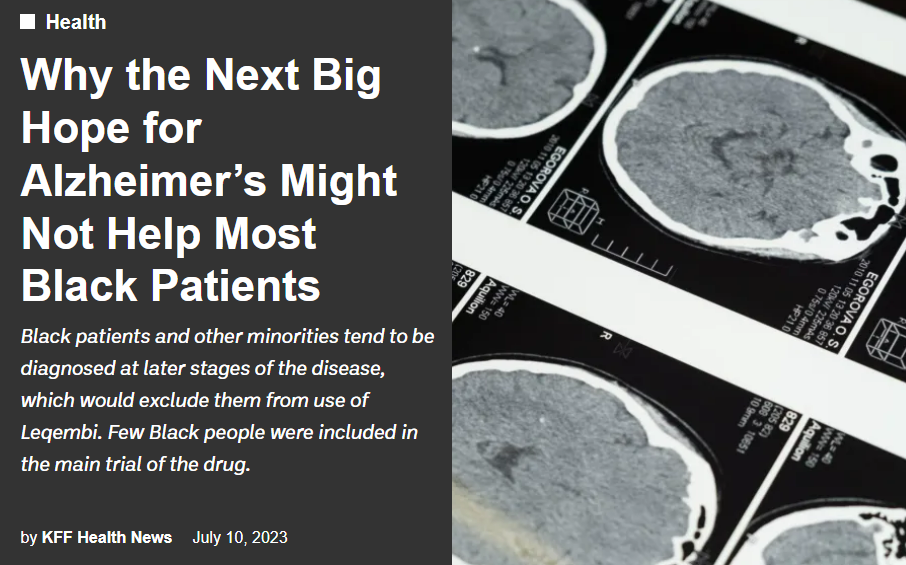Why the Next Big Hope for Alzheimer’s Might Not Help Most Black Patients
By Arthur Allen
July 10, 2023

The FDA on Thursday gave full approval to what many scientists and doctors believe is the first drug to show promise of slowing the progression of Alzheimer’s disease.
But while patient advocates are celebrating, critics see it as the unfortunate triumph of a flawed theory of the disease’s cause and predict the rollout of the drug will aggravate racial disparities in elder care.
An FDA advisory panel last month voted 6-0 to support FDA approval of lecanemab, from the Japanese pharmaceutical company Eisai. In a clinical trial involving nearly 1,800 early-stage Alzheimer’s patients, the drug slowed progression of the disease somewhat in those who got biweekly infusions, compared with those given a placebo.
But the drug didn’t reverse Alzheimer’s symptoms, and it will require careful monitoring of patients for months or years, including many brain scans. Those receiving lecanemab, which carries the brand name Leqembi, were twice as likely as placebo recipients in the major trial to suffer hemorrhaging or swelling in the brain. These incidents, related to the drug’s stripping away of amyloid proteins, were generally minor, but three deaths appear to have been caused by the drug.
With the FDA’s approval of lecanemab, Eisai is set to promote it to the primary care physicians who treat most dementia patients and critics are speaking out. Some say the drug, which Eisai plans to market for $26,500 a year, offers false hope. Others say any positive impact it has won’t benefit lower-income patients, who tend to be diagnosed too late for the drug to be effective, and usually receive care in settings ill-equipped to handle the drug’s stringent requirements.
“The most likely consequence of this medication is to take resources and attention away from addressing basic supports for older adults with cognitive impairment,” said Maria Glymour, chair of the Department of Epidemiology at the Boston University School of Public Health. The money spent on expensive drugs like lecanemab would be better invested in fighting diseases like high blood pressure and diabetes, which hasten dementia, and on community-based services for older adults, she said.
The critique of lecanemab builds on another complexity of the drug’s approval: Few African Americans were involved in testing it.
Of the 859 people infused with lecanemab during the trial, only 20 were Black. Minorities are often underrepresented in research, but this study had an additional barrier, said Carey Gleason, a clinical neuropsychologist at the University of Wisconsin School of Medicine and Public Health. Many Black volunteers in the trial “screened out,” she said, because PET scans showed relatively low levels of amyloid in their brains. Lecanemab works by removing amyloid, so the trial organizers excluded patients — regardless of their Alzheimer’s symptoms — if their PET scans were negative.
Eisai spokesperson Libby Holman said the company worked to enroll a diverse population but that amyloid levels “differed among racial and ethnic groups.” She added, “If individuals do not have elevated amyloid, they do not have Alzheimer’s disease.”
[READ FULL ARTICLE HERE]
